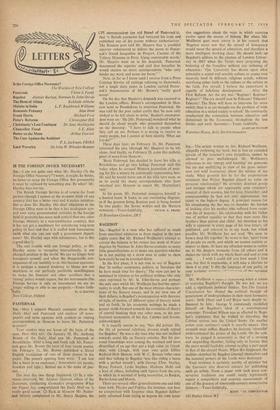SIR,—May I support Pharos's comment about the Daily Mail and
Pasternak and implore all news- papers and news agencies with resident or visiting correspondents in Moscow to leave Mr. Pasternak in peace?
Your readers may not know all the facts of the case. Here they are: On January 30, Mr. Anthony Brown of the Daily Mail saw Mr. Pasternak at Peredelkino. After a long and frank talk Mr. Paster- nak gave Mr. Brown the texts of four recent poems. On February 11,' Mr. Brown published a literal English translation of one of these poems in his paper. The poem's opening lines were: 'I am lost like a beast in an enclosure,/ Somewhere are people, freedom and light./ Behind me is the noise of pur- suit. . .
The next day two things happened. (1) In, a tele- vision interview, Mr. Alastair Dunnett, editor of the Scotsman, conducting Granada's programme What the Papers Say, congratulated the Daily Mail on 'a really good scoop.' (2) Back in Moscow Mr. Paster- nak bitterly complained to Mr. Henry Shapiro, the UPI correspondent (an old friend of Pasternak's), that 'a British journalist had betrayed his trust and published one of his poems without authorisation.' The Russian poet told Mr. Shapiro that 'a youthful reporter volunteered to deliver 'the poem to Paster- nak's friend Jacqueline de Proyart, Curator of the Tolstoy Museum in Paris. Using unprintable words,' Mr. Shapiro went on in his despatch, 'Pasternak denounced the reporter and said that hereafter he would receive no more correspondents "who only hinder my work and cause me harm."'
Now, as far as I know (and I receive from a Press Cuttings Service all cuttings referring to Pasternak), not a single daily paper in London carried Paster- nak's denunciation of Mr. Brown's 'really good scoop,'
On the day that Shapiro's despatch was received in the London offices, Reuter's correspondent in Mos- cow went to Peredelkino to interview Pasternak. He was told by the poet rather curtly that 'he now only wished to be left alone to write.' Reuter's correspon- dent went on : 'He [Mr. Pasternak] wondered what he should do about people who presented themselves on the doorstep: "I have to talk to people when they call on me. Perhaps it is wrong to receive so many people, but I cannot sit here silently. What am I to do?" '
Three days later, on February 16, Mr. Pasternak reiterated his plea (through Mr. Shapiro) to be left alone, And finally, on February 20, came this pathetic piece of news from Moscow : 'Boris Pasternak has decided to leave his villa at Peredelkino and go into hiding. Pasternak said this today when he accused Western journalists of mak- ing his life a misery by continually importuning him. He said he would move out of his villa very soon, so as to avoid the many correspondents who have swarmed into Moscow to report Mr. Macmillan's visit.'
In his poem, Mr. Pasternak compares himself to a hunted beast. It looks, to our everlasting disgrace, as if the greatest living Russian poet is being hunted by two packs: the Soviet writers •and the Western
newsmen.—Yours faithfully, VICTOR S. FRANK 28 Bramham Gardens, SW5


































 Previous page
Previous page